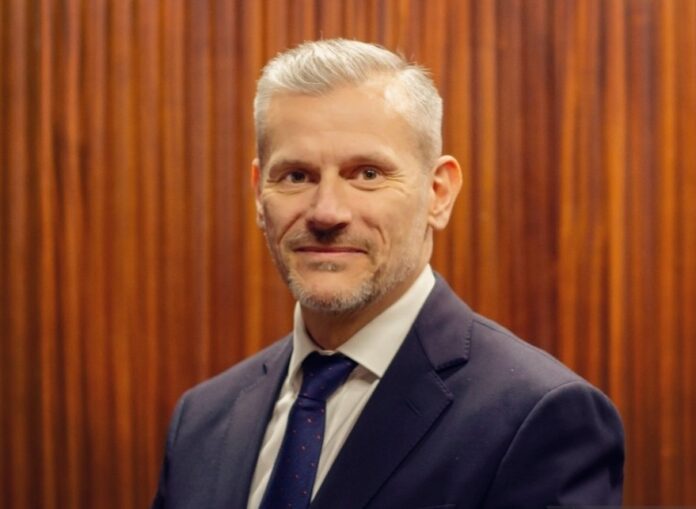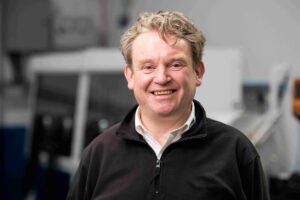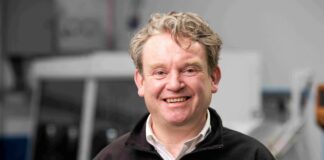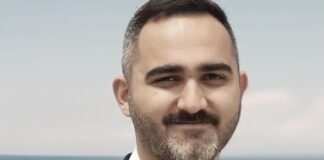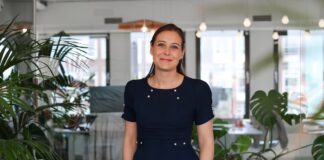Trovr is transforming the way people return and recycle drink containers by offering accessible, space-saving and user-friendly technology for independent retailers
Can you tell us about the story behind Trovr and what industry experiences inspired you to launch the company?
Trovr is a recycling technology company on a mission to make recycling single-use drink containers easy, rewarding, and accessible for everyone. We’ve developed the QUBE – a compact, smart recycling machine designed specifically for independent retailers – along with consumer and merchant apps that turn recycling into a rewarding experience.
I’m a serial entrepreneur with many years’ experience leading sustainability investments. however originally from a media background having spent my early business career in music, print media, marketing and events. Coming from outside the recycling industry gave me the ability to look at the challenges around DRS (Deposit Return Scheme) from a different perspective.
The industry has been stuck in conventional thinking, focusing only on large-scale machines for supermarkets. I asked, “Why are we ignoring independent retailers, where are their solutions?” They were being left with an impossible choice: invest £10,000 plus in big machinery they couldn’t afford, or resort to unhygienic plastic bags behind the counter. Yet in most countries they’re legally required to participate in the DRS. We created the Trovr QUBE to fill that gap.
What values and principles guided you in establishing Trovr?
Our core principle is accessibility – making sustainable recycling solutions available to everyone, not just those who can afford expensive infrastructure. We believe in turning regulatory compliance into a business opportunity rather than burden. We see ourselves as enablers, here to support scheme operators, brands, retailers and consumers. Most importantly, we’re driven by genuine environmental impact. In the EU, where our machines are already live and being used by consumers, retailers and seen measurable increases in customer footfall and engagement plus high rates of in-store recycling. That’s what this is really about.
What is the long-term vision of Trovr, and what steps are you planning to achieve it?
Our immediate focus in early 2026 is scaling UK trials to several hundred machines, then rolling out our target of 20,000 machines ahead of the October 2027 Deposit Return Scheme launch. 2026 will see DRS schemes launching in Singapore, Spain, Portugal, Uruguay and Greece. Our plan is to provide the Trovr QUBE to the independent retail sector in all these countries plus launch our solution in all existing DRS territories in the EU.
The DRS is a powerful environmental initiative that actually works to increase recycling rates to a much higher level. As a company we aim to be part of the overall solution and keep driving up recycling rates but targeting 50,000+ machines installed across Europe.
The growth of our QUBE network enables the growth of our Trovr consumer platform and digital business. Our ultimate vision goes beyond recycling machines – we’re building a consumer loyalty platform and marketing engine at scale. If we reach those numbers with 50+ daily interactions per machine, we’re talking about a platform that offers significant consumer marketing reach. The QUBE is the endpoint of a transaction, but the app is the beginning of a relationship.
How do you define success for Trovr, and what milestones are you aiming to reach in the coming years?
Success for me is deeply personal – it’s about making a real dent in the plastic crisis. Millions of tonnes of plastic enter our oceans each year, equivalent to dumping a garbage truck full of plastic every single minute. Each year the world generated 353 million tonnes of plastic waste, and only a small percentage of all plastic has ever been recycled. Those numbers genuinely keep me up at night. Future generations will inherit this mess unless we act now. This is an indefensible man-made problem which we can and must fix.
Success means helping achieve that 90% recycling rate mandated by the EU. We’ve already seen it work where our machines are live and operational. We’ve witnessed measurable increases in plastic recycling. That’s not theoretical; that’s real impact happening now. If communities and counties can scale that globally, we’re talking about genuinely changing the trajectory of plastic in our environment. The commercial milestones – 20,000 UK machines within three years, multiple revenue streams – only matter if they deliver environmental impact.
Who is the primary target audience of Trovr, and how do you ensure their specific needs are met?
Our primary target is the independent convenience sector in the UK, most of whom will be legally required to participate in the Deposit Return Scheme (DRS) from October 2027 but have been ignored by the traditional recycling machine industry. These are your local corner shops, independent retailers, petrol stations – businesses with limited space, tight budgets, and minimal operational complexity. We are also targeting any other locations that sell drinks products. This includes cafes, gyms, sports clubs, hospitals, rail stations etc plus voluntary return points such as charities and schools. We believe DRS is a great way to support charitable giving. Donate your 20p deposit to the charity of your choice.
We’ve purpose-built the QUBE specifically for small location constraints.
At just 0.37m² footprint – roughly the size of an ATM – it’s four times cheaper and considerably smaller than traditional Reverse Vending Machines. We also offer our affordable Trovr “DRS as a Service” subscription which includes hardware, software and maintenance to break down a barrier to entry. With zero upfront cost our subscription offer removes the painful capital expenditure decision. The handling fees they earn – typically 1-2p per container – can make Trovr QUBE a cost-neutral solution from month one if the retailer fully engages his consumer community in the recycling process.
What feedback have you received from independent retailers so far, and how does it influence your product development?
The feedback has been brilliant across all our live markets. In EU counties where our machines are already operational and being used by consumers, retailers appreciate how the system integrates seamlessly into their operations without disrupting workflow or taking up valuable space.
Retailers tell us they love the real-time data through our Merchant Dashboard – they can see exactly what’s being recycled and create custom in-app offers to drive repeat visits. The biggest relief is eliminating manual handling – no more bags behind the till, no more hygiene risks, no more staff involvement and cost. That feedback reinforces we’ve solved the right problem in the right way.
What are the biggest challenges you have faced since founding Trovr, and how have you overcome them?
The biggest challenge has been educating the market. The Trovr QUBE is a new and disruptive technology supported by a new attitude and business models. It did not exist before we built it hence our need to introduce and prove its value to the industry. Most independent retailers naturally see DRS as financially challenging. Not because they don’t care about the environment but because of the cost and operational implications to their businesses. We are shifting their perception by demonstrating our tech can turn DRS into a viable commercial opportunity by driving footfall instore. Increased traffic can naturally lead to increased revenue. Our message is not to steer away from DRS but to embrace the opportunity. Trovr QUBE is there to enable new revenue.
Another challenge was proving durability and reliability – the company has invested €3million plus in product development and long-term testing to ensure durability and deliver a fully EU compliant product. The regulatory landscape is complex, but by working directly with scheme operators and integrating with their systems, we’ve ensured seamless compliance.
How do you adapt to market changes or unexpected obstacles in the recycling and deposit return sector?
We stay agile by maintaining close relationships with scheme operators, regulators, and retail trade associations across multiple markets. When regulatory timelines shift or requirements change, we adapt quickly because our technology is modular – the QUBE can operate completely offline or connect via WiFi, Ethernet, or 4G LTE. Having a team with over 100 years of collective experience in delivering integrated software and hardware solutions helps us anticipate challenges before they become obstacles too.
What sets Trovr apart from other solutions in the deposit return and reverse vending space?
Firstly to note, the Trovr QUBE is not an RVM although it has similar functions, the technical mechanics are fundamentally different. The QUBE is a IOT based smart collection device purpose-built for small footprint retail locations whilst traditional Reverse Vending Machines (RVMs) are designed for supermarkets with compacting capabilities. The QUBE targets independent retailers operating taking part in manual DRS collections. Our direct competition is actually a plastic bag behind the counter, and we offer numerous advantages over that.
We combine affordability with a compact footprint – considerably smaller than most RVMs on the market. We act as a platform enabler and vital tool for retailers which makes us non-threatening to all stakeholders. Our patent-protected design and offline capability provide deployment flexibility.
Our long-term differentiation lies in our business approach to monetise the asset through different media channels. This is to create new revenue streams for the retailers ending in a positive cashflow position.
Our Trovr consumer app provides a digital ticket option to remove the need to create paper ticket waste. Also, a digital DRS payment system to return consumer deposits to their chosen destination. The app has a loyalty points platform that can be utilised by the retailers plus in app advertising. As part of our future roll out plan, we will be introducing a range of consumer services for example in app payment cards and DRS savings accounts.
What unique services or capabilities do you offer that retailers can only find with you?
We’re the only solution combining affordability, compact footprint, and new revenue generation for independent retailers. Traditional Reverse Vending Machines crush containers; as a manual handling device the QUBE scans, weighs, and securely stores them, keeping the technology simpler and more affordable whilst preventing fraud practices sometimes associated with manual collection.
Our Merchant Dashboard provides real-time recycling data and lets retailers create custom in-app discounts to convert recycling activity into repeat visits. The offline capability means you can deploy a QUBE at a festival or remote location without the internet. And we’re building a consumer loyalty ecosystem through the Trovr App where consumers earn rewards and can exchange points for cash or vouchers from thousands of brands. No one else offers this complete package.
What new projects or expansions do you have planned for Trovr in the near future?
We’re launching our own Trovr retail media screen network with each QUBE installed. The retailer has a choice to be part of the Trovr media network and will receive a revenue share from media sales. A combination of the media advertising and Trovr consumer app help us provide brand partners with a unique consumer and product data set. Brands will be able to understand granular data on dwell time, demographics, and reach. Actively, we are talking talking to brands about ecosystem partnerships and app co-marketing.
We’re preparing a rollout in Ireland ahead of the UK DRS launch. We’re exploring franchise opportunities with petrol station networks and developing school partnerships to educate young people about recycling. Beyond Europe, we’re looking at Singapore, Uruguay, South America, Africa, and US states already running DRS schemes. The goal is to establish Trovr as the global technology provider for accessible DRS infrastructure.
What three key pieces of advice would you give to people starting their own hardware or sustainability-focused business?
First, make a solution for an existing problem, not the other way around. Once you find the problem in need of an answer, deep dive into the size of the market to confirm there is scale. Don’t try to be everything to everyone – we focused on independent retailers who’d been ignored, and that clarity drove everything from design to pricing.
Second, make your solution economically viable from day one. Sustainability businesses fail when they rely on goodwill rather than solid business models. Our subscription model can make the QUBE cost-neutral immediately, removing barriers to adoption. Retailers see it as a revenue opportunity, not a cost.
Third, bring a fresh perspective to old problems. Coming from outside the sector is fine but make sure you are supported by professionals from inside your target industry. Don’t be afraid to challenge the status quo. Nothing in this world would ever change or advance without disrupters. So, push the boundaries, dare to be different and understand any new tech development always takes twice as long and costs twice as much as you expect.
Picture Nick Yeatman@ Multiplier
Thank you Nick Yeatman for the Interview
Statements of the author and the interviewee do not necessarily represent the editors and the publisher opinion again.


